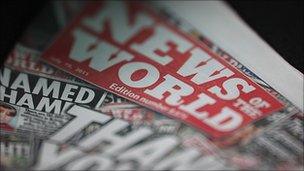Phone hacking: Cameron widens remit of Leveson probe
- Published
- comments

The inquiry will examine media practices at the News of the World and other papers
The prime minister has broadened the terms of references of Lord Justice Leveson's inquiry into phone hacking.
He also named six people - ranging from journalists and police officers to civil rights campaigners - as members of the inquiry panel.
David Cameron said its remit would be widened to include broadcasters and social media networks.
Lord Justice Leveson said the public inquiry could start hearings in weeks.
Mr Cameron said the inquiry would examine media practices and relations between the press, politicians and police and would have the power to call witnesses to give evidence under oath.
He said its terms of reference had been widened to include other police forces and not just the Met and said: "The inquiry should consider not just the relationship between the press, police and politicians but their individual conduct too."
Mr Cameron added: "The inquiry should look not just at the press but other media organisations, including broadcasters and social media, if there is any evidence that they have been involved in criminal activities."
The panel will include Liberty director Shami Chakrabarti and former Daily Telegraph political editor George Jones.
Labour leader Ed Miliband welcomed the widening of the terms of references and the appointment of those on the panel.
Mr Cameron told the Commons the inquiry's remit is to look not just at the phone hacking scandal but also the wider issue of relationships between politicians, journalists and police officers.
He said of the panel: "These people have been chosen not only for their expertise in the media, broadcasting, regulation, government and policing, but for their complete independence from any interested parties."
Mr Cameron laid out the inquiry's terms of reference in detail. It will inquire into the culture, practices, and ethics of the press, including:
Contacts and relationships between national newspapers and politicians, and the conduct of each
Contacts and the relationship between the press and the police, and the conduct of each
The extent to which the current policy and regulatory framework has failed including in relation to data protection
The extent to which there was a failure to act on previous warnings about media misconduct
Lord Justice Leveson - who, as Brian Leveson, led the prosecution team in the Rose West murder trial in 1995 - said: "The panel and I will be meeting shortly to discuss how we want to go about our task, and to consider our priorities.
"The inquiry must balance the desire for a robustly-free press with the rights of the individual, while at the same time, ensuring the critical relationships between the press, Parliament, the government and the police are maintained.
"The press provides an essential check on all aspects of public life. That is why any failure within the media affects us all. At the heart of this inquiry therefore may be one simple question: who guards the guardians? "
The inquiry will make recommendations on:
A new more effective policy and regulatory regime which supports the integrity and freedom of the press, the plurality of the media, and its independence, including from government, while encouraging the highest ethical and professional standards
How future concerns about press behaviour, media policy, regulation and cross-media ownership should be dealt with by all the relevant authorities, including Parliament, government, the prosecuting authorities and the police
The future conduct of relations between politicians and the press
The future conduct of relations between the police and the press
Ms Chakrabarti said she was "privileged" to be on the panel and added: "My acceptance is a vote of confidence in the vital role of independent judicial process in times of national difficulty.
"It comes from an optimism in the ability of a great democracy to look itself in the mirror in the spirit of rebuilding public trust.
"It reflects Liberty's belief in an appropriate balance between personal privacy and media freedom and above all in the rule of law."